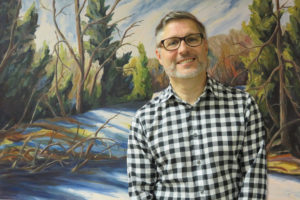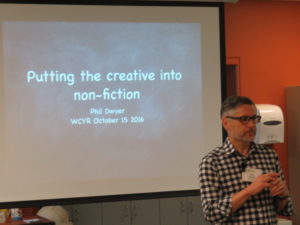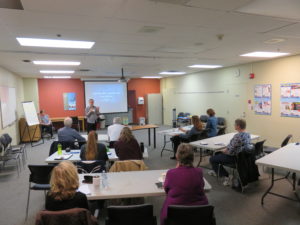Your cart is currently empty!

Interview with Phil Dwyer, Author of Conversations on Dying
Earlier in the WCYR season we were blessed with a seminar/workshop held by Phil Dwyer about breaking into creative non-fiction. We had a fantastic turnout and learned a lot about making the shift from pure fiction to creative non-fiction. I had an opportunity to chat with Phil afterwards and ask him a few burning questions I thought you all might be interested in knowing about too 😉
So please, follow me down the rabbit hole to learn more about just how real Alice’s world can be.
An Interview with Phil Dwyer
 Q: You mentioned during your Workshop on “Putting the Creative into Non-Fiction”, that non-fiction books (excluding memoir) tend to outsell fiction books 11 – 1. That’s an incredible margin of difference. How would you advise a fiction writer to work toward finding their niche in the non-fic market and begin to make that transition?
Q: You mentioned during your Workshop on “Putting the Creative into Non-Fiction”, that non-fiction books (excluding memoir) tend to outsell fiction books 11 – 1. That’s an incredible margin of difference. How would you advise a fiction writer to work toward finding their niche in the non-fic market and begin to make that transition?
A: That’s something I saw online, and there was no data to back it up, so we should take it with a pinch of salt. But it does make sense.
If you look at the bestseller lists at any given moment you’ll find the top 100 books are absolutely dominated by non-fiction.
Outside of a few very high profile writers, it’s hard for a writer of fiction to crack the top 100. True, many of these non-fiction titles are recipe, self-help and how-to books, but a talented writer can, with a bit of imagination, span these genres with an inspirational book that also exhibits literary qualities. I wouldn’t necessarily exclude memoir from this either. Memoir is treated like fiction by agents and publishers because the writing is the critical thing, but historically, memoir has outsold most fiction. People love true stories. Memoir has cooled a little in the past few years. There have been, for example, a lot of “my struggle with drugs/alcohol/sex addiction stories. A lot of cancer survivor stories, etc. To catch an agent’s attention now you have to come with a fresh angle. But it’s still a genre that sells well when you get it right.
Q: I loved your topic on “Playing with Form” and thoroughly enjoyed trying out using the unique list you supplied to the group. As a fiction writer who is used to (at least loosely) following the form for my genre, how would I begin to find markets interested in non-fic based around your list: Cosmo Quiz, Ingredients List/Recipe, Press Release, Back of Box Marketing, Ad Copy, Safety Regulations, Classified ad, Manual, and so on?
A: Experiment with it. Play with it. Find out what works for you and your story. With exercises like that there’s always the danger of getting gimmicky, so use it sparingly, when you have a story that suits a certain form. I used the Cosmo Quiz form for my Answers Mostly D story, because it was about a relationship gone badly wrong. The assumptions that underpin the Cosmo Quiz are that you can analyze and ‘fix’ your relationships by answering a few simple questions, and the results are spat out at the bottom. Of course, life is much more complex and difficult than that, so that story is, at a certain level, toying with the reader’s expectations and assumptions about the form.
If the form doesn’t fit, the story won’t work, but when it fits it adds a dimension that enriches the story, adds layers of meaning, and helps it stand out.
Once you have something you’re satisfied with, my advice would be to try sending it to a few contests. I would avoid starchy publications like Malahat and go for newer markets like Narrative, or the Carte Blanche/Creative Non Fiction Consortium prize. But these days most of the literary magazines carry Creative Non Fiction, so if you’re getting nowhere with the contests try those.
Q: Would you ever encourage a fiction writer to help support their author platform by offering free creative non-fiction stories or novellas? How might this self-publishing route for their creative non-fic help or hinder their platform?
A: Well, first, let’s exclude memoir and personal anecdotes here, because they’re different. But if we’re talking the kind of non-fiction project I might take on, I wouldn’t recommend this route. Non-fiction is time consuming to write. There’s a lot of research, a lot of background checking, a lot of time spent immersing yourself in the topic. To give all of that away would be crazy. I would start by picking topics you think you might be able to sell into one of the more commercial markets: Macleans for example, or the Walrus.
The right query letter should get an editor interested, if there’s really a story there.
Then you at least know you’re going to get paid for the work you’re going to do, and you’ll know the story you’ve chosen has legs. But if you pick the right topic it’s easier to get attention for it than with fiction. As you know, there are so many writers out there trying to draw attention to their work, and a lot of them are very talented. The writing has to really shine. With non-fiction the story is as important as the writing. Don’t get me wrong, the writing is still important, and the craft must still be there, but a fascinating true story trumps everything. It makes it easier to get published, and from there you can use your platform to promote your fiction.
Q: With your vast experience as a journalist and writer, what did it mean for you to choose traditional publishing, and the building of a proposal to shop around, to present your book to the world?
 A: I wrote a piece for TechCrunch on this topic a couple of years ago. You can read it here. To me it’s not about a book, or an article. If you want to be a writer you have to think longer term than that: what is this going to do for my career? What kind of books do I want to be writing, how will each one build on the last? So for me it was important to find the right agent, someone who would be on board for the long haul, and help me forge the kind of career I want. Putting together the proposal was a necessary part of that: it snagged an agent’s interest, demonstrated professionalism and a thoughtful approach to my book.
A: I wrote a piece for TechCrunch on this topic a couple of years ago. You can read it here. To me it’s not about a book, or an article. If you want to be a writer you have to think longer term than that: what is this going to do for my career? What kind of books do I want to be writing, how will each one build on the last? So for me it was important to find the right agent, someone who would be on board for the long haul, and help me forge the kind of career I want. Putting together the proposal was a necessary part of that: it snagged an agent’s interest, demonstrated professionalism and a thoughtful approach to my book.
Finding the right publisher may be a little more tricky, because there are diminishing options out there, especially in Canada. I’ll not pretend it’s easy.
Publishers are under immense financial pressures. They have to do more with less every day. But I’d still tell almost everyone who wants to build a long-term writing career to go the traditional route for the reasons outlined in that TechCrunch article, and because it instantly legitimizes your work. It’s confirmation that you’ve reached a certain level of expertise and craft. I know there are a good many wonderful self-published books coming out every year, but look at the data in the TechCruch piece: on average, authors do better from traditionally published books in the long run. Why else would Lisa Genova switch to a traditional publisher after the success of her self-published book Still Alice?
Q: You mentioned in the workshop that authors really need to allow themselves to shop around and be willing to research and ask questions of their potential agents and publishers. So often these “gate keepers” are seen as minor-gods and if a writer is offered a contract by one or the other we feel foolish saying anything but an automatic yes. Why shouldn’t we count our blessings and blindly sign the dotted line?
A: I’ll give you the same answer I gave in the workshop: Agents don’t have a job without people like us — people who are willing to assume the risk of spending huge amounts of time researching and developing stories. People who are willing to invest in a very uncertain future, with their time and their own hard-earned dollars. I’ve been working on what I hope will be my next book for four years now. I’ve spent a lot on travel, and by the time it’s published I’ll have spent a lot more. I doubt I’ll see all that money back, to be honest (unless I happen to win some grants).
Publishers and agents need us. They need our work, and rely for their own livings on our passion and our dedication to our stories and our craft.
It feels as if the power is all with agents and publishers, because as you say, they are the ones who decide who gets published and who doesn’t. Your job is just to make sure your stories and your writing is un-ignorable. You have to do that in your own way. I can tell you how it worked for me, but how it worked for me won’t necessarily work for you. In the end, it comes down to story. Fiction or non-fiction, great stories will always find readers, markets, publishers and agents. Find yourself great stories and write them as well as you know how, and you’ll get there eventually.
Finally, on this topic, it’s important you find yourself the right agent because your relationship with your agent is (ideally) a long-term commitment. And like any long-term commitment, it’s important to find the right fit. You wouldn’t get married to someone just because they asked (at least I wouldn’t). Approach picking your agent in the same way. Look for someone whose business ethics and approach match your own. And of course, they have to love your work, because they have to sell it.
Q: When you agreed to sign with Dundurn Press for the publication rights to Conversations on Dying, how did you know it was the right fit for you? Were you taken aback by their automatic assignment of a “light edit” to your book? And what did you do, knowing your own propensity for multiple drafts and pushing the limits on content regarding this issue?
A: I spoke with friends and colleagues who had been published by Dundurn. I spoke with my agent. I read everything I could find online by Dundurn staff: the acquiring editor, the publicists, the sales and marketing team.
Dundurn made its reputation publishing Canadian stories, and mine was a very Canadian book.
I didn’t expect it to sell well outside of Canada, so it seemed a perfect fit for this project. I was flattered when they gave my book an A rating (which meant they didn’t expect to have to devote much time to the edit), but at the same time I know that I like to take risks when I write. Some come off, some don’t. I knew I wouldn’t be comfortable taking those risks unless I had a safety net, an editor I trust who would “catch” me and reign me in if my riskier risks didn’t come off. So I hired an editor I’d worked with before to do a substantive edit of my first draft. That edit helped me shape the manuscript and revise it to the point where I was happy submitting it for a light copy edit.
Q: What advice do you have for writers of non-fiction and/or fiction?
A: Hemingway said write what you know. John Irving completely disagrees with that. I’m with Irving.
Write what you’re passionate about, whatever that is. That’s how you’re going to find your distinctive voice and your audience.
You’re going to face a lot of rejection. It will be dispiriting at times. We all go through it. Everyone. Jane Austen went through it. George Orwell went through it. Why should I be any different? Why should you?
When she was 11 years old, my wife Natalie wrote to Stephen King and told him she wanted to be a writer. She asked for his advice. She still has the postcard he wrote back to her. He said:
Read everything, good and bad, and write as often as you can. ~ S. King
I’d echo that, but I’d add read widely in your genre. You should know it intimately. Some people say you must write every day if you want to be considered a writer. That’s taking an unnecessarily puritanical view in my opinion. It’s setting you up for periods of guilt when you simply don’t have the time or the energy to write. Be kinder to yourself than that. But don’t “wait for inspiration” either.
Inspiration is much more likely to find you if you’re standing in its path.
Writing is work. It’s sometimes very hard work. A lot of very good writers hate actually doing it (Dorothy Parker said: “I hate writing, but I love having written.”). So look for strategies that make it easier.
 Have two or three projects on the go at any one time. When you run out of energy for one, pick up one of the others. You may find it has more fire in it for you. This summer, while I was working on the proposal for my next book, I wrote a short piece for a collection I’m working on (which may or may not be the book after the one I’m doing the proposal for) and a long narrative poem for my granddaughter Myrtle. The poem I wrote for fun (it’s called Scary Mary the Hairy Fairy). I’m going to get my daughter to illustrate it, and give it to Myrtle for Christmas (she’s the poem’s hero, so I don’t see how it won’t be a hit with my target audience).
Have two or three projects on the go at any one time. When you run out of energy for one, pick up one of the others. You may find it has more fire in it for you. This summer, while I was working on the proposal for my next book, I wrote a short piece for a collection I’m working on (which may or may not be the book after the one I’m doing the proposal for) and a long narrative poem for my granddaughter Myrtle. The poem I wrote for fun (it’s called Scary Mary the Hairy Fairy). I’m going to get my daughter to illustrate it, and give it to Myrtle for Christmas (she’s the poem’s hero, so I don’t see how it won’t be a hit with my target audience).
The point is, you sometimes have to write for the sheer hell of it. Just to have fun, with no expectation of reward or publication, just to remind yourself why you started to do this in the first place.
Just to get your energy back for the job. You’ll return to your other work refreshed, with the energy to pick it up and push it forward. Trust me, it works.
Thank you for taking the time to share your perspective and experience with our writing community. The experience was truly invaluable.